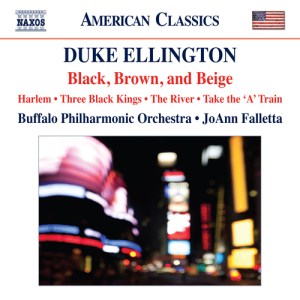 |
 |
|

Support
us financially by purchasing this disc from: |
|
|
|
|
|
|
|
Duke ELLINGTON (1899-1974)
Harlem (orch. Maurice Peress) (1950) [14:27]
Black, Brown, and Beige - Suite (orch. Maurice Peress) (1943)
[18:29]
Three Black Kings - Ballet (completed by Mercer Ellington)*
(1943) [18:10]
The River - Suite (orch. Ron Collier) (1970) [21:04]
Billy STRAYHORN (1915-1967)
Take the ‘A’ Train† (arr. Ellington) (1939)
[6:19]
 Sal Andolina (clarinet* and alto saxophone*†); Tony Di Lorenzo
(trumpet†); Amy Licata (violin†)
Sal Andolina (clarinet* and alto saxophone*†); Tony Di Lorenzo
(trumpet†); Amy Licata (violin†)
Buffalo Philharmonic Orchestra/JoAnn Falletta
rec. Kleinhans Music Hall, Buffalo, New York, USA, 9-11 May 2012
DDD
Naxos American Classics
 NAXOS 8.559737 [78:30]
NAXOS 8.559737 [78:30]
|
|
|
Duke Ellington was celebrated as a major big-band leader and
pianist from the 1920s through to the 1970s. His concert music
has had less attention. That said this is by no means the first
time that this aspect has been addressed. Most prominently this
was done by Neeme Järvi and the Detroit Symphony across
CHAN 9909, CHAN 9926 and CHAN 9154, overlapping with two of
the three works here.
Harlem is sub-titled A Tone Parallel to Harlem.
It’s a work blessed with a mercurial wealth of ideas smoothly
and kaleidoscopically varied. The versatile Buffalo Philharmonic
Orchestra and JoAnn Falletta have no blushes and only confidence
for its big-band jazzy jolt. It’s worth bearing in mind
that in the 1970s this was the orchestra that delivered a devastatingly
apt CBS
LP of Gershwin Broadway overtures under the baton of Michael
Tilson Thomas. There’s clearly something in the DNA there.
The brass and percussion in particular play it down and dirty
with total conviction as in the smokily delivered up-swelling
at 8:33 in Harlem.
The Black, Brown, and Beige suite swings, sashays and
smooches moodily in the two outer movements, which occasionally
can be heard casting sideway glances at Gershwin. There’s
a Delian sigh to the Brown central movement which is
Ellington’s tribute to the African-American soldiers of
the Civil War and World Wars I and II.
Three Black Kings deploys railroad rhythm excitement
in King of the Magi, more dank Delian bluesiness and
sighing romance in King Solomon and deep affection in
the extremely likeable Martin Luther King movement. This
tripartite piece was left unfinished at Ellington’s death
and was completed by his son.
In 1970 Ellington was commissioned by the American Ballet Theater
to write a dance work with choreography by Alvin Ailey. It was
for piano and big-band. The score was adapted for full orchestra
by Ron Collier and five of those nine episodes are recorded
here: The Spring, The Meander, The Giggling
Rapids, The Lake and The River. This is a
score affluent in inspiration and accommodating of Hollywood
sentiment alongside poetic and jazzy populism. The music is
also open to the moody and desolate cosmopolitan dark nights
of the Philip Marlowe novels and the paintings of Edward Hopper.
I note that the Järvi version on Chandos includes two movements
not featured here: Vortex and Village Virgins.
Take the ‘A’ Train was Ellington’s signature
number. It is incurably up-beat and street-confident. That’s
what it gets from Buffalo and Falletta. The extended violin
solo from Amy Licata is worthy of Grappelli.
The notes by Edward Yadzinski are fully up to the task.
A vital and very generous collection showcasing a concert Ellington
who loved his commercial roots yet had more to give and gave
it.
Rob Barnett
|
Support
us financially by purchasing this disc from:
|
|
|
|
|
|
|
|
|
|
|




 All Nimbus reviews
All Nimbus reviews








